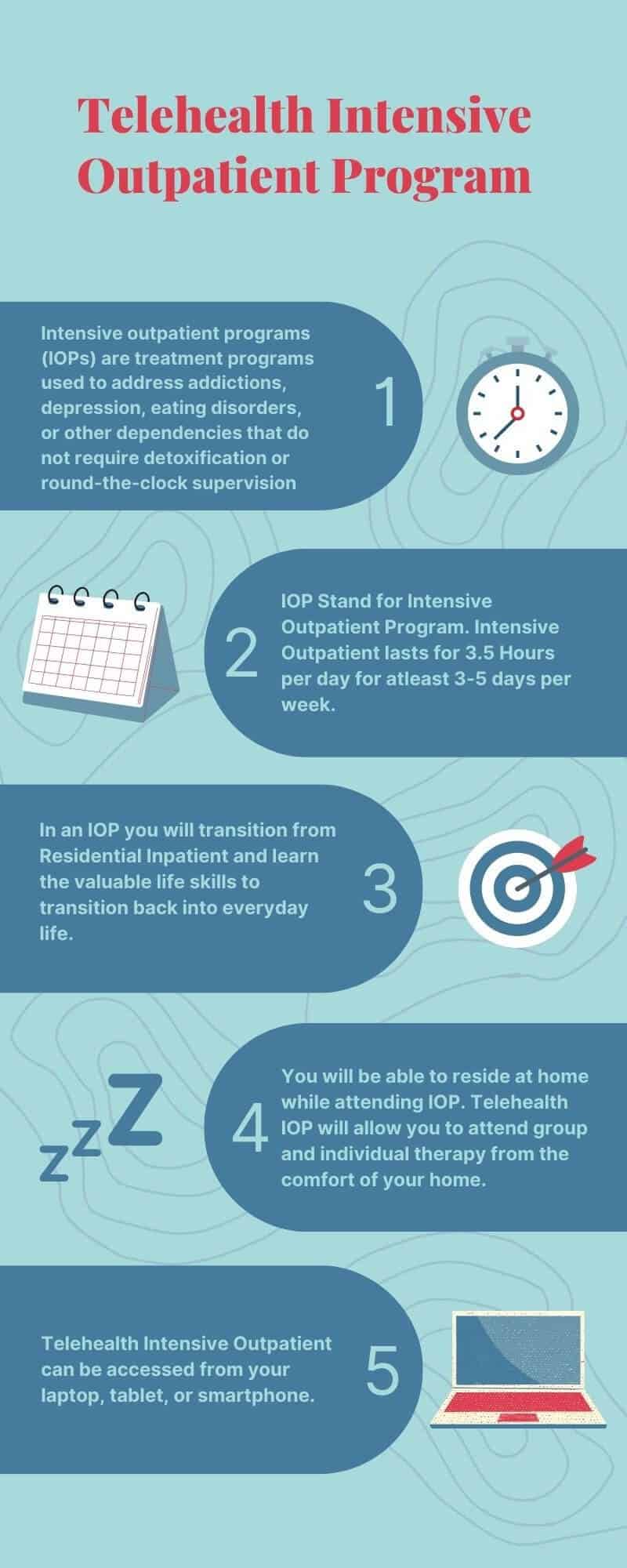The Advantages of Intensive Outpatient Program (IOP) for Long-Term Health.
The Advantages of Intensive Outpatient Program (IOP) for Long-Term Health.
Blog Article
Navigating the Intricacies of Twin Medical Diagnosis Treatment Within an Intensive Outpatient Program Establishing
In the world of mental health and wellness and dependency therapy, the intersection of double medical diagnosis offers a nuanced challenge that demands a thorough and tailored method. Within the boundaries of an Intensive Outpatient Program (IOP) setting, the intricacies of addressing co-occurring mental health and wellness problems and substance utilize problems require a delicate equilibrium of knowledge and sources to navigate. The combination of evidence-based practices, collective initiatives among multidisciplinary teams, and a keen understanding of the special demands of each person are essential components in successfully handling twin medical diagnosis within an IOP structure. By exploring the complexities of twin medical diagnosis treatment within this intensive outpatient context, a clearer course emerges in the direction of holistic and sustainable healing for those facing these intertwined difficulties.
Dual Diagnosis Overview

Comprehending dual diagnosis is vital as it requires a detailed and incorporated method to therapy. By recognizing the interplay in between material use and psychological wellness, health care providers can tailor treatments to meet the distinct demands of each individual. This alternative technique not just addresses signs yet also targets hidden variables that contribute to the double diagnosis.
In addition, without treatment twin diagnosis can cause a cycle of regression and aggravating psychological wellness symptoms. By recognizing the complexity of double diagnosis and supplying customized treatment, medical care experts can sustain people in attaining lasting recovery and improved mental well-being.
Tailored Treatment Strategies
Recognizing the complex interplay in between compound usage conditions and psychological health and wellness problems, the growth of customized therapy strategies is critical in resolving the intricacies of twin medical diagnosis in psychological health and wellness therapy. Customized therapy strategies are individualized strategies that consider the unique needs, challenges, and goals of people encountering twin medical diagnosis. These strategies are created collaboratively by a multidisciplinary group of experts, including psychiatrists, psychologists, social employees, and dependency experts, to guarantee thorough and incorporated care.
Tailored therapy strategies commonly include a combination of treatments, medicines, and behavioral treatments that target both the compound use disorder and the psychological health and wellness condition simultaneously. These strategies may include cognitive-behavioral treatment, dialectical behavior modification, medication-assisted therapy, private counseling, team treatment, and household therapy, among various other evidence-based treatments. By tailoring treatment methods to specific situations, tailored plans can address the source of twin medical diagnosis, promote lasting recovery, and boost overall lifestyle for individuals dealing with co-occurring disorders.
Integrated Treatment Approach
An incorporated treatment method in twin diagnosis treatment incorporates medical, emotional, and social treatments to resolve the complicated demands of address individuals with co-occurring compound usage disorders and mental wellness conditions. This technique identifies that treating one element of a twin diagnosis without resolving the other can result in inadequate outcomes. By integrating clinical treatments such as medication management for psychological wellness problems with psychological therapies like cognitive-behavioral treatment for material usage disorders, individuals receive detailed treatment that targets all elements of their dual diagnosis.
In addition, the social facet of integrated care involves dealing with ecological variables that might add to the growth or perpetuation important usage and mental wellness issues. This can include household characteristics, housing instability, or absence of social assistance. By integrating social treatments like family members therapy, employment assistance, and area sources, the therapy becomes more alternative and customized to the individual's certain needs. In general, an incorporated care approach in double medical diagnosis therapy within an extensive outpatient program setting aims to supply thorough, efficient, and individualized like people encountering co-occurring disorders.
Challenges in IOP Setting
In the context of dual diagnosis treatment within an extensive outpatient program, browsing the complexities of co-occurring compound use disorders and psychological health and wellness problems provides significant difficulties. Among the primary hurdles in the IOP setting is the control of care in between mental wellness experts and material abuse professionals to guarantee a comprehensive therapy approach. This needs reliable communication, cooperation, and a deep understanding of how these conditions connect and influence each various other.

Additionally, dealing with stigma and resistance to therapy within the IOP setting can hamper progress. Some people might be hesitant to divulge their twin diagnosis or may feel Check This Out ashamed, hindering their engagement in the healing procedure. Conquering these barriers demands an encouraging and non-judgmental atmosphere that cultivates trust and visibility.

Collaborative Specialist Efforts
Effective double medical diagnosis treatment in an extensive outpatient program requires smooth cooperation among mental health professionals and substance misuse professionals to make sure an extensive and integrated approach to care. By working with each other, these professionals can create personalized therapy plans that provide to the distinct demands of each client, thinking about both their mental wellness and compound misuse difficulties.
Joint efforts have a peek here additionally encompass routine interaction and info sharing amongst staff member to make certain a cohesive therapy strategy. This may include situation seminars, joint sessions with the client, or shared documents to track progress and change therapy strategies as needed. Furthermore, cooperation may include entailing various other healthcare professionals such as medical care medical professionals or family therapists to supply all natural support to the client. Eventually, a joined front of specialists collaborating enhances the efficiency of twin medical diagnosis treatment within an intensive outpatient program.
Verdict
To conclude, reliable double diagnosis treatment within an intensive outpatient program setting needs tailored treatment plans and an integrated treatment strategy. Obstacles might emerge in this setup, yet joint initiatives amongst experts can assist navigate these complexities. By attending to the special demands of people with co-occurring psychological health and wellness and compound utilize conditions, IOP programs can offer detailed and alternative care to support recovery and overall health.
Report this page